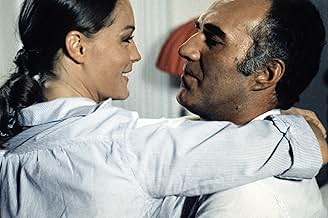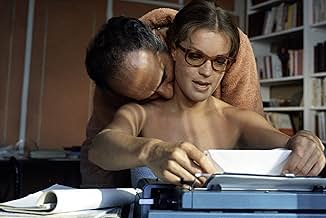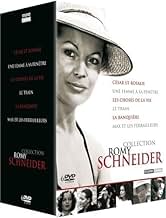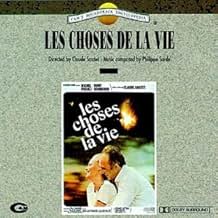Les choses de la vie
- 1970
- Tous publics
- 1h 29m
IMDb RATING
7.4/10
6K
YOUR RATING
A highway engineer is involved in a car crash, after which, near death, he remembers his life leading up to the accident.A highway engineer is involved in a car crash, after which, near death, he remembers his life leading up to the accident.A highway engineer is involved in a car crash, after which, near death, he remembers his life leading up to the accident.
- Awards
- 1 win & 2 nominations total
Featured reviews
I loved the novel . And I was seduced by the film. Because it represents more than a good adaptation.
First, it is a beautiful new demonstration of the art of Claude Sautet to explore facts behind the silence veil, from the complexity of relation to the vulnerabilities and certitudes, the basic traits of bourgeous life and the spirit of family, the loneliness and the game of apparences.
Second, for the great acting .
Not the last, for the powerful scenes, the most intense remaining the wedding and the ship ignoring him. Romy Schneider is just admirable in each scene, few of them reminding The assasination of Trotsky.
More than a good adaptation, it is a poem about essence of life, about regrets, decissions and force / meanings of love. And , sure, about the cold plus tard.
One of the most impressive virtues, the scenes of accident , splendid because, reading, years ago, the novel, I believed than that scenes are impossible to be proposed by a film . But, I ignored the gifts of a Claude Sautet.
First, it is a beautiful new demonstration of the art of Claude Sautet to explore facts behind the silence veil, from the complexity of relation to the vulnerabilities and certitudes, the basic traits of bourgeous life and the spirit of family, the loneliness and the game of apparences.
Second, for the great acting .
Not the last, for the powerful scenes, the most intense remaining the wedding and the ship ignoring him. Romy Schneider is just admirable in each scene, few of them reminding The assasination of Trotsky.
More than a good adaptation, it is a poem about essence of life, about regrets, decissions and force / meanings of love. And , sure, about the cold plus tard.
One of the most impressive virtues, the scenes of accident , splendid because, reading, years ago, the novel, I believed than that scenes are impossible to be proposed by a film . But, I ignored the gifts of a Claude Sautet.
By watching this 1969 movie, I have just confirmed my opinion about Claude Sautet: that's one Director that takes the expectator "inside the scene" (As seen in his latest work: Nelly and Mr.Arnaud). He has this ability that allows him to "extract" the most of his characters in the psychologic aspect, by showing all the range of their feelings...Take the scene where Pierre Berard (portrayed by Michel Piccoli) tells Héléne (played by Romy Schneider) of his sudden decision of no longer accompany her on a trip planned ages ago. Another scene that worths appears in a record as a "Death Scenes Hall of Fame" is the one in which Pierre lays on the grass, his thoughs exposed as the expectator follows him, in all his emotional suffering. Claude Sautet: a Director that deserves having his name written in the "Hall of Fame of the Greatest Directors of All Times". As an "homage" to him, in a scale of 10, I grade this film 9.
10rutel
Yesterday (Dec 15, 2001 I saw "Intersection" (with Richard Gere and Sharon Stone), so, I immediately wanted to see the original and ... there is no place like home. I went to a Blockbuster and, once again, the original is much better. Try to see it and you wont regret
A typical 70's drama, something that still gets its way when it comes to touch that emotional key in us (Or some of us) and makes us long for that passionate love story, without a tragic end of course. Through a filter of pastel tones, Sautet portrays the typical struggle many have put themselves through to fork onto a secondary sentimental route in life, thinking they can have it both ways. Albeit its apparent sappy tone, Les Choses de la Vie is an intense mature story of love and sacrifice, a double one at the end.
I find European dramas very attractive, perhaps because they portray a kind of no-frills passion that is very hard to come across nowadays, both in movies and in reality. A movie like this surely has its clichés, the dual life, the regrets, the tragic death but in this movie Sautet is a wizard in enfolding the viewer with a very bitter-sweet sequence of happy yet solemn flashbacks. Pedro Lazaga's Largo Retorno (1975) happens to be similar in the way the relationship between the two main characters comes to an end (The memories, the sorrow, the death), granted in Les Choses de la Vie there is a three-way story. Both Michel Piccoli and Romy Schneider fit perfectly in the above scheme of things.
Just like in Largo Retorno, a very somber yet passionate baroque score complements the entire movie, leaving us with a soggy handkerchief at the end.
I find European dramas very attractive, perhaps because they portray a kind of no-frills passion that is very hard to come across nowadays, both in movies and in reality. A movie like this surely has its clichés, the dual life, the regrets, the tragic death but in this movie Sautet is a wizard in enfolding the viewer with a very bitter-sweet sequence of happy yet solemn flashbacks. Pedro Lazaga's Largo Retorno (1975) happens to be similar in the way the relationship between the two main characters comes to an end (The memories, the sorrow, the death), granted in Les Choses de la Vie there is a three-way story. Both Michel Piccoli and Romy Schneider fit perfectly in the above scheme of things.
Just like in Largo Retorno, a very somber yet passionate baroque score complements the entire movie, leaving us with a soggy handkerchief at the end.
Pierre Bérard is a man in his forties, a lean and attractively masculine architect exuding self-confidence and that nuanced shade of charisma in gray-flannel suits executive display like a second nature.
On a sunny day in the French countryside near Nantes, a lorry full of pigs is caught in the middle of an intersection; blocking the way to Pierre's car coming at full speed, and with a truck coming in the opposite direction, Pierre can't avoid the head to tail, he veers off the road, hits a tree, spins and turns over and over before being ejected on the grass. The accident lasts less than ten seconds but is treated like a longer interval allowing Pierre to recall all the events that preceded it... and also to tell us that real people don't 'go out' with style and only Sautet's artistic license made a truly engaging character out of a rather ordinary man.
Now, there's more than the "whole-life-flashes-before-eyes" trope, more than the brutality of a sudden accient that the magic of cinema can stretch to a long exhausting hour, itself being the result of ten days of shooting, there's more to it. There's a stylistic decision from Claude Sautet that marks one single event with the stamp of human obsession: like the Golden Palm winner of 1966, "Blow-up" and a mysterious picture or the winner of 1974 "The Conversation" with a mysterious recording, the adaptation of Paul Guimard's novel explores an 'act of God' with the hopeless insistence suggesting that something ever went wrong.
The title gives the unique clue, that's only part of the "things of life".
The film opens with an unscrewed wheel rolling like the last remain of a life in motion. Pierre is lying motionless on the grass, his car already burnt up. Cut to Pierre, lying in bed, with Hélène (Romy Schneider), so much younger we suspect she's not the woman with the ring. There's something about Michel Picolli's physique that makes him strangely more appealing than matinee idol Delon, whose movies with Schneider feel designed to attracts younger audiences. Picolli with his receding hairline, his silvery sideburns, his hairy chest and his naturalness makes the relationship somewhat more relatable.
The intentionally unsubtle transition to the first flashback exposes a naked truth about Pierre's life. The whole accident is shown in slow-motion and intercut with events and incidents set before, getting us close enough to his state of mind during the brief lapse of his accident to seize the irony of his whole life: only when he regained control that he was caught off-guard. In the slow-motion parts, you can see in his face a grim look either out of anticipation of pain, or worse, the realization that he had just broken his "Pot of Milk" like La Fontaine's dairymaid.
Picolli dominates the screen, his chemistry with Helene is believable but there's something so 'definite' about their project to leave for Tunis that it doesn't fool us about Pierre's motivation. He's got a life besides Hélène: a job, a friend (Jean Bouise), a gifted son (Gérard Lartigau) who manufactures electronics gadgets and his ex-wife Catherine (Lea Massari). Every ordinary moment has a sort of casual nonchalance, not interesting in the cinematic meaning, the expositional value would even compromise our interest if it wasn't for Piccoli floating above his own arc with a thinly veiled duplicity.
When he takes an old childhood picture from an old relative or when he has an intimate conversation with ex-wife he grows some complicity, it's like the unexpected activation of the subconscious before something dramatic would happen. And so the flashbacks all build up to the moment where he cancels his holidays with Helene, to spend more time with son. He's evasive in his explanations, with the guilt-ridden expression of a man who can't make the fatal move, I could relate to it. The middle-act weakens the characters but humanizes him in the process.
His chain-smoking isn't even a detail, he smokes so much that IMDb's cigarette count on the Trivia page made me laugh (46, by the way). It's not much the addiction but rather the necessity to plug himself to old habits, the unmovable forces that govern his life without hurting anyone but him.
Another scene shows his first encounter with Helene during an auction, outbidding her for such a futile piece of art it leaves no doubt about her status as the trophy girl. Helene becomes the lighthouse illuminating his second youth, shown through romantic outdoors interludes à la "Love Story", all converging toward the tragic intersection and its nihilistic taste bacK.
Life is a series of random events that constitute our arc, the events that prompted Pierre to write a letter, to retract himself for sending it, to make the final choice, Pierre talking to himself and letting the viewers know the contents of his thoughts, all these things don't amount to much when destiny decides to cut short all our goals and projects.
When Pierre is lying on the ground like Rimbaud's "Sleeper of the Valley", his thoughts are internalized, passing the torch to the more traditional voice-over (that might have inspired the final monologue in "Carlito's Way"). Images aren't set in the past but in a future too idealized to be taken at face value. Indeed, when Pierre's imagination starts, his reality is fading out slowly, becoming the subject of morbid curiosity. The show of life goes on with the anticlimactic spectacle of normality: angry drivers, quarreling couples, policemen, doctors, hospitals and all that jazz.
We're never in total control of our lives, and as one of my friends used to tell me, we spend our life writing the past, not the future, or like John Lennon said, "life is what happens while you're busy making plans" or as LaFontaine said:
When I'm alone, I dare the utmost: [...] Diadems rain down on me.
Some chance event then brings me to my senses, And I'm my lowly self again.
On a sunny day in the French countryside near Nantes, a lorry full of pigs is caught in the middle of an intersection; blocking the way to Pierre's car coming at full speed, and with a truck coming in the opposite direction, Pierre can't avoid the head to tail, he veers off the road, hits a tree, spins and turns over and over before being ejected on the grass. The accident lasts less than ten seconds but is treated like a longer interval allowing Pierre to recall all the events that preceded it... and also to tell us that real people don't 'go out' with style and only Sautet's artistic license made a truly engaging character out of a rather ordinary man.
Now, there's more than the "whole-life-flashes-before-eyes" trope, more than the brutality of a sudden accient that the magic of cinema can stretch to a long exhausting hour, itself being the result of ten days of shooting, there's more to it. There's a stylistic decision from Claude Sautet that marks one single event with the stamp of human obsession: like the Golden Palm winner of 1966, "Blow-up" and a mysterious picture or the winner of 1974 "The Conversation" with a mysterious recording, the adaptation of Paul Guimard's novel explores an 'act of God' with the hopeless insistence suggesting that something ever went wrong.
The title gives the unique clue, that's only part of the "things of life".
The film opens with an unscrewed wheel rolling like the last remain of a life in motion. Pierre is lying motionless on the grass, his car already burnt up. Cut to Pierre, lying in bed, with Hélène (Romy Schneider), so much younger we suspect she's not the woman with the ring. There's something about Michel Picolli's physique that makes him strangely more appealing than matinee idol Delon, whose movies with Schneider feel designed to attracts younger audiences. Picolli with his receding hairline, his silvery sideburns, his hairy chest and his naturalness makes the relationship somewhat more relatable.
The intentionally unsubtle transition to the first flashback exposes a naked truth about Pierre's life. The whole accident is shown in slow-motion and intercut with events and incidents set before, getting us close enough to his state of mind during the brief lapse of his accident to seize the irony of his whole life: only when he regained control that he was caught off-guard. In the slow-motion parts, you can see in his face a grim look either out of anticipation of pain, or worse, the realization that he had just broken his "Pot of Milk" like La Fontaine's dairymaid.
Picolli dominates the screen, his chemistry with Helene is believable but there's something so 'definite' about their project to leave for Tunis that it doesn't fool us about Pierre's motivation. He's got a life besides Hélène: a job, a friend (Jean Bouise), a gifted son (Gérard Lartigau) who manufactures electronics gadgets and his ex-wife Catherine (Lea Massari). Every ordinary moment has a sort of casual nonchalance, not interesting in the cinematic meaning, the expositional value would even compromise our interest if it wasn't for Piccoli floating above his own arc with a thinly veiled duplicity.
When he takes an old childhood picture from an old relative or when he has an intimate conversation with ex-wife he grows some complicity, it's like the unexpected activation of the subconscious before something dramatic would happen. And so the flashbacks all build up to the moment where he cancels his holidays with Helene, to spend more time with son. He's evasive in his explanations, with the guilt-ridden expression of a man who can't make the fatal move, I could relate to it. The middle-act weakens the characters but humanizes him in the process.
His chain-smoking isn't even a detail, he smokes so much that IMDb's cigarette count on the Trivia page made me laugh (46, by the way). It's not much the addiction but rather the necessity to plug himself to old habits, the unmovable forces that govern his life without hurting anyone but him.
Another scene shows his first encounter with Helene during an auction, outbidding her for such a futile piece of art it leaves no doubt about her status as the trophy girl. Helene becomes the lighthouse illuminating his second youth, shown through romantic outdoors interludes à la "Love Story", all converging toward the tragic intersection and its nihilistic taste bacK.
Life is a series of random events that constitute our arc, the events that prompted Pierre to write a letter, to retract himself for sending it, to make the final choice, Pierre talking to himself and letting the viewers know the contents of his thoughts, all these things don't amount to much when destiny decides to cut short all our goals and projects.
When Pierre is lying on the ground like Rimbaud's "Sleeper of the Valley", his thoughts are internalized, passing the torch to the more traditional voice-over (that might have inspired the final monologue in "Carlito's Way"). Images aren't set in the past but in a future too idealized to be taken at face value. Indeed, when Pierre's imagination starts, his reality is fading out slowly, becoming the subject of morbid curiosity. The show of life goes on with the anticlimactic spectacle of normality: angry drivers, quarreling couples, policemen, doctors, hospitals and all that jazz.
We're never in total control of our lives, and as one of my friends used to tell me, we spend our life writing the past, not the future, or like John Lennon said, "life is what happens while you're busy making plans" or as LaFontaine said:
When I'm alone, I dare the utmost: [...] Diadems rain down on me.
Some chance event then brings me to my senses, And I'm my lowly self again.
Did you know
- TriviaCigarette count: 46
- GoofsIn the car crash scene, the stunt double for Michel Piccoli is seen wearing brown gloves in close-ups. However Piccoli is bare-handed while driving.
- ConnectionsFeatured in Claude Sautet ou La magie invisible (2003)
- How long is The Things of Life?Powered by Alexa
Details
- Release date
- Countries of origin
- Language
- Also known as
- The Things of Life
- Filming locations
- Rue de Sèvres, Paris 7, Paris, France(Hélène shopping)
- Production companies
- See more company credits at IMDbPro
Box office
- Gross US & Canada
- $5,063
- Gross worldwide
- $5,063
- Runtime
- 1h 29m(89 min)
- Sound mix
- Aspect ratio
- 1.66 : 1
Contribute to this page
Suggest an edit or add missing content































